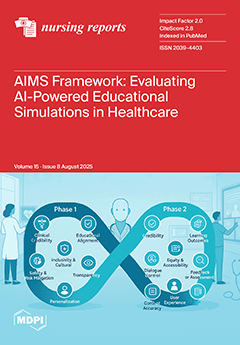Background: The U.S. Medicare Annual Wellness Visit (AWV) offers a structured opportunity for cognitive screening and personalized prevention planning among older adults. Yet, implementation of AWVs, particularly for individuals with cognitive impairment, remains inconsistent across primary care or other diverse care settings.
Methods: We conducted a scoping review using the Consolidated Framework for Implementation Research (CFIR) to explore multilevel factors influencing the implementation of the Medicare AWV’s cognitive screening component, with a focus on how these processes support the detection and management of cognitive impairment among older adults. We searched four databases and screened peer-reviewed studies published between 2011 and March 2025. Searches were conducted in Ovid MEDLINE, PubMed, EBSCOhost, and CINAHL databases. The initial search was completed on 3 January 2024 and updated monthly through 30 March 2025. All retrieved citations were imported into EndNote 21, where duplicates were removed. We screened titles and abstracts for relevance using the predefined inclusion criteria. Full-text articles were then reviewed and scored as either relevant (1) or not relevant (0). Discrepancies were resolved through consensus discussions. To assess the methodological quality of the included studies, we used the Joanna Briggs Institute critical appraisal tools appropriate to each study design. These tools evaluate rigor, trustworthiness, relevance, and risk of bias. We extracted the following data from each included study: Author(s), year, title, and journal; Study type and design; Data collection methods and setting; Sample size and population characteristics; Outcome measures; Intervention details (AWV delivery context); and Reported facilitators, barriers, and outcomes related to AWV implementation. The first two authors independently coded and synthesized all relevant data using a table created in Microsoft Excel. The CFIR guided our data analysis, thematizing our findings into facilitators and barriers across its five domains, viz: (1) Intervention Characteristics, (2) Outer Setting, (3) Inner Setting, (4) Characteristics of Individuals, and (5) Implementation Process.
Results: Among 19 included studies, most used quantitative designs and secondary data. Our CFIR-based synthesis revealed that AWV implementation is shaped by interdependent factors across five domains. Key facilitators included AWV adaptability, Electronic Health Record (EHR) integration, team-based workflows, policy alignment (e.g., Accountable Care Organization participation), and provider confidence. Barriers included vague Centers for Medicare and Medicaid Services (CMS) guidance, limited reimbursement, staffing shortages, workflow misalignment, and provider discomfort with cognitive screening. Implementation strategies were often poorly defined or inconsistently applied.
Conclusions: Effective AWV delivery for older adults with cognitive impairment requires more than sound policy and intervention design; it demands organizational readiness, structured implementation, and engaged providers. Tailored training, leadership support, and integrated infrastructure are essential. These insights are relevant not only for U.S. Medicare but also for global efforts to integrate dementia-sensitive care into primary health systems. Our study has a few limitations that should be acknowledged. First, our scoping review synthesized findings predominantly from quantitative studies, with only two mixed-method studies and no studies using strictly qualitative methodologies. Second, few studies disaggregated findings by race, ethnicity, or geography, reducing our ability to assess equity-related outcomes. Moreover, few studies provided sufficient detail on the specific cognitive screening instruments used or on the scope and delivery of educational materials for patients and caregivers, limiting generalizability and implementation insights. Third, grey literature and non-peer-reviewed sources were not included. Fourth, although CFIR provided a comprehensive analytic structure, some studies did not explicitly fit in with our implementation frameworks, which required subjective mapping of findings to CFIR domains and may have introduced classification bias. Additionally, although our review did not quantitatively stratify findings by year, we observed that studies from more recent years were more likely to emphasize implementation facilitators (e.g., use of templates, workflow integration), whereas earlier studies often highlighted systemic barriers such as time constraints and provider unfamiliarity with AWV components. Finally, while our review focused specifically on AWV implementation in the United States, we recognize the value of comparative analysis with international contexts. This work was supported by a grant from the National Institute on Aging, National Institutes of Health (Grant No. 1R01AG083102-01; PIs: Tzeng, Kuo, & Raji).
Full article






